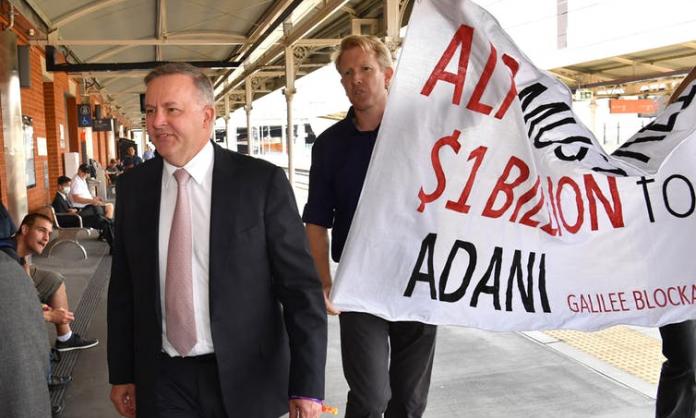The focus of people’s anger about Australia’s bushfire catastrophe has, rightly, been on prime minister Scott Morrison. But while the Coalition government he leads is no doubt the A team of Australia’s fossil fuel industry, the Labor Party isn’t far behind. During the current crisis, it’s given up the pretence of opposition entirely, at times acting as little more than publicists for the government’s appalling positions.
In early December, when the bushfires had been raging across NSW and Queensland for months, federal Labor leader Anthony Albanese attacked the idea that Australia should limit coal exports, telling reporters, “If Australia stopped exporting today there would not be less demand for coal – the coal would come from a different place”.
One wonders if Albanese would apply the same logic to, say, the activities of (now jailed) Mexican drug lord Joaquín “El Chapo” Guzmán. Arguably, the supply of drugs he provided to the US and other markets (which are now provided by others operating in his place) was much less damaging to society than the huge quantities of carbon emissions produced around the world via the burning of Australian coal.
Also in early December, Labor shadow resources minister Joel Fitzgibbon argued that Australians need to “stop demonising our coal”. This, of course, is a totally normal and appropriate thing to do during an unprecedented climate change-fuelled bushfire crisis. No doubt he was worried that the fires may threaten coal’s natural habitats – like Parliament House in Canberra, for instance.
More recently, when asked directly about Scott Morrison’s handling of the bushfire crisis, Albanese said it wasn’t the time for criticism. “I would rather talk about what is needed; it is not my job to give a critique of Scott Morrison”, he said. Which makes you wonder whether he knows what the word “opposition” means.
None of this should come as a surprise to anyone who has paid attention to Labor’s trajectory in the aftermath of its 2019 election defeat. One of the main conclusions Labor drew from that debacle was that it must prove itself just as devoted to Australia’s fossil fuel industry as the government is. Fitzgibbon has gone furthest, arguing that the party should junk its current policy of a 45 percent emissions reduction on 2005 levels by 2030, in favour of matching the Coalition’s aim of a 26 percent to 28 percent reduction.
To see the true extent of Labor’s devotion to the coal barons, however, you need to look beyond the debate about these (already completely inadequate) emissions reduction targets at what’s happening on the ground. Labor might, for now, have a slightly higher long term target for reducing domestic emissions. But it’s marching in lockstep with the government when it comes to the expansion of Australia’s booming coal and gas industries, which export massive, and rapidly increasing, quantities of emissions around the world.
Australia is already the world’s biggest exporter of both coal and gas. An August 2019 report by the Australia Institute found that, measured in terms of the emissions potential of fossil fuel exports, Australia ranks third in the world, behind only Russia and Saudi Arabia. Similarly, the University of New South Wales’ Australia’s Carbon Majors Report, published in October 2019, found that emissions traceable to Australia’s six biggest coal producers are greater than the emissions of the entire domestic economy.
These figures highlight the absurdity of claims that Australia is “doing our bit” on climate change. It would be more accurate to say that Australia is currently doing our bit to hasten the climate apocalypse, rather than halt it.
Across the north of the country, an unprecedented expansion of coal and gas production is under way. In Queensland is Adani’s Carmichael coal mine, the construction of which could pave the way for the opening of the entire Galilee Basin. Scientists estimate that if all the mines planned for the Basin reach full production, they will give rise to carbon emissions totalling 705 million tonnes a year – more than Australia’s current annual emissions.
At the same time, gas production is at record levels, and vast new projects are in the pipeline across Western Australia, the Northern Territory and Queensland. As journalist Michael West wrote in early January, “In 2020, the war between climate campaigners and the fossil fuel lobby is poised to escalate dramatically as a slew of large fossil fuel projects push towards approval and production”.
West quoted gas analyst Bruce Robertson, who described the scale of development as “unprecedented”: “This is the biggest tranche of fossil fuel projects I have seen in my lifetime ... They are accelerating the development of fossil fuels at the moment at a pace I’ve never seen. The scale is mind-blowing”.
The centre of the gas boom is Western Australia. According to a 2018 report by Climate Analytics, emissions from current and proposed gas projects in the state would amount, at full production, to more than four times what Australia’s energy system can emit under the Paris Agreement.
The thing that’s often missed in discussions of these developments is that most of them are occurring in states where the Labor Party is in government. The Queensland Labor government led by Annastascia Palaszczuk has been a consistent advocate for Adani. And in Western Australia, the governing Labor Party has explicitly rejected federal Labor’s 45 percent emissions reduction target in favour of the “aspirational” (read: optional) target of zero emissions by 2050 and given the green light to fossil fuel companies to propose their own timelines and targets for emissions reductions.
Victorian Labor premier Daniel Andrews – who is often touted as the most progressive of all the current Labor leaders, and who is perceived as being better than others on climate change – is also an enthusiast for the gas craze. In 2018, Andrews opened five new offshore oil and gas exploration blocks in the Otway Basin off the south-west coast. Then, in early 2019, the government opened a tender for companies offering drilling services for onshore oil and gas exploration in the basin – an indication that a state-wide ban on onshore drilling put in place in 2014 is unlikely to be renewed when it expires on 30 June this year.
Whatever the differences in their rhetoric about climate change, both Labor and the Liberals share the common goal of governing in the “national interest”. And the “national interest” always means the interest of big business and the rich.









